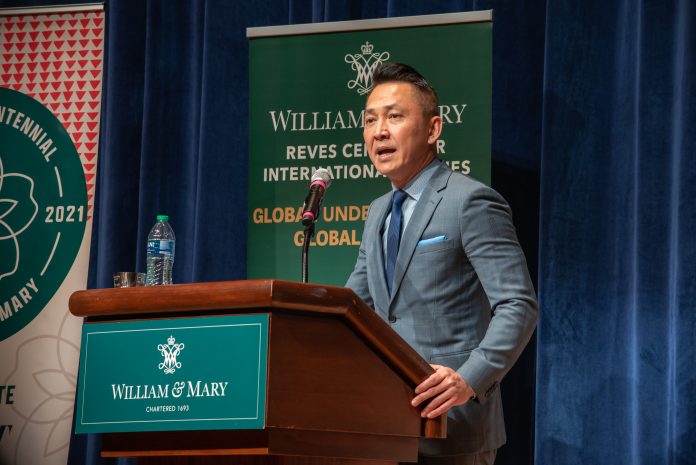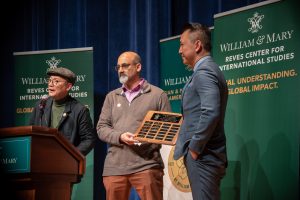
Wednesday, April 20, the Reves Center for International Studies and the Asian Centennial Committee awarded Pulitzer Prize-winning author Viet Thanh Nguyen the Hatsuye Yamasaki ’37 Prize for Visionary Leadership. Nguyen also gave this year’s McSwain-Walker Lecture titled “Refugees, Language and the Meaning of America.”
Nguyen centered his lecture around the role of language and memory in contexts of war and immigration.
Nguyen is best known for his fiction works, including “The Refugees” and “The Sympathizer,” which won a 2016 Pulitzer Prize. Nguyen is also the Aerol Arnold Chair of English and professor of English, comparative literature and American studies and ethnicity at the University of Southern California. Much of Nguyen’s writing — both academic and literary — deals with war, memory and diaspora, particularly relating to Vietnam.
For Francis Tanglao Aguas, Asian and Pacific Islander American studies and theater professor and co-chair of the Asian Centennial Committee, the variety of Ngyuen’s works is significant.
“Dr. Nguyen is a shining exemplar of creativity alongside ‘traditional’ academic scholarship, demonstrating to all, especially the new generation of Asian Americans, that there is no need to favor one talent or gift over another,” Tanglao-Aguas said.
“Nguyen’s work sheds light on the Asian American experience and the history of U.S. involvement in Vietnam,” Assistant Professor of English and APIA studies Professor R. Benedito Ferrão added. “Importantly, as a public intellectual, he has also commented in op-eds about racism, anti-Asian hate and issues affecting immigrants.”
Ferrão therefore sees Ngyuen as a perfect choice for the Hatsuye Yamasaki Prize, which is named after the first woman of Asian descent to attend the College of William and Mary. The award honors exemplary leaders among the Asian and Pacific Islander and Southwest Asian communities.

The Reves Center also chose Nguyen as the speaker for the 2022 McSwain-Walker Lecture, which invites creative and engaging public figures to discuss the ways in which other cultures and countries interact with the United States.
Nguyen began his lecture by exploring how language shapes the ways refugees are perceived in the United States.
“We, as Americans, like to use language to insulate ourselves from some of the realities of our country and our world for which we’re responsible,” Nguyen said.
To Nguyen, this is exemplified in the stigmatization of the term “refugee.” He spoke about how calling refugees “immigrants” de-emphasizes the impact of the wars that led to their current circumstances. Nguyen resolutely identifies as a refugee, though he recognizes that by definition, he is not one anymore. This decision is an effort to show solidarity with those who are dehumanized.
“I wanted to embrace refugee experience,” Nguyen said. “I wanted to embrace the unwanted. I wanted to believe that it was possible to extend kinship from our own to others.”
Nguyen specifically pointed out how Vietnamese people have been marginalized as refugees.
“In the United States, when people say the word Vietnam, what they usually mean is not the country, but the war,” Nguyen said. “And when we talk about the Vietnam War, Vietnamese people are usually dehumanized.”
Nguyen also expressed concern over how many Vietnamese Americans have now fallen victim to the “good” versus “bad” immigrant rhetoric and engage in othering behavior toward different refugee groups. To Nguyen, this thinking is illogical, considering Vietnamese people once faced a persecution similar to the persecution many Muslim or central American immigrants face today.
“Hopefully we realize how problematic that binary of good and bad is,” Nguyen said. “I think about some of these so-called bad refugees and I think, what did they learn their behavior from?”
Nguyen then reflected on how some of the allegedly “bad” Vietnamese refugees engaged in condemnable actions as a result of the unstable situations in their home country.
Throughout the lecture, Nguyen used personal and often humorous narratives to supplement his broader ideas. From his earliest memories in a refugee camp to experiences in college, Nguyen highlighted the moments in his life when he had to grapple with race and identity.
In one such story, Nguyen recalled internalizing his family’s otherness when a white store owner blamed Nguyen’s parents for putting Americans out of business. Nguyen connected this incident with a larger pattern of “yellow peril” that has tormented Asian Americans throughout American history, including in the case of Art Matsu at the College.
“Soon after his coming to this campus, the Virginia government state government passed a racial purity act designed to prevent interracial relationships between white people and people of color, instigated specifically by the presence of Art Matsu, the good minority who rapidly became the bad minority,” Nguyen said.
In his book “Nothing Ever Dies: Vietnam and the Memory of War,” Nguyen argues that all wars are fought twice — first on the battlefield, then in memory. Much of Nguyen’s lecture was dedicated to understanding the power of stories and collective memory.
He remembered his experiences as a child watching American movies about the Vietnam war, particularly the film “Apocalypse Now.”
“I’m rooting for the American soldiers up until the moment they kill or massacre Vietnamese civilians,” Nguyen said. “And in that moment I feel myself split in two. Am I the American doing the killing or am I the Vietnamese being killed?”
This split was a major theme in Nguyen’s lecture and resonated with Sabrina Gerald ’23, who identifies as half Vietnamese.
“A lot of the points that he made are common in Asian American literature, about like double consciousness,” Gerald said. “I just really enjoyed hearing that.”
This double consciousness and concept of memory helped Nguyen reckon with the significance hidden inside stories. He reflected on how the roles Vietnamese people often have in films — as victims screaming, crying or thanking American soldiers — contribute to the concession of their inhumanity.
“Realizing how powerful stories are, realizing that they could save and destroy, it made me want to be a writer,” Nguyen said.
Now Nguyen hopes his work challenges the way readers think. In particular, he is proud of how “The Sympathizer” angers almost everyone. Nguyen attributes this reaction to the way he portrays both humanity and inhumanity in all his characters.
“The dehumanized among us who have no need to prove our own humanity, we have to understand that being only human is a trap of marginalization,” Nguyen said. “It restricts us to the place of being angels and victims.”
Nguyen expressed that Vietnamese people can’t just be seen as victims — only by embracing the full spectrum of humanity and inhumanity can their stories truly be centered.
Aguas hopes that Nguyen can encourage students at the College to pursue similar endeavors and bold ideas.
“We need more writers of color from all our communities: Asian Americans, African Americans, Native, Latina/Latino, to tell their stories,” Tanglao-Aguas said. “This is what inspiring writers like Viet Thanh Nguyen have the capacity to influence given their platform and the power of their works.”
That is ultimately what encourages Nguyen to keep writing. For him, it was vital to discover the literature of marginalized communities and stories that could connect to people who looked like him and his parents.
“And that was what helped to heal the split,” Nguyen said: “My belief that we actually could, in fact, forge a country through our activism, through academics, through our art, through our very existence in which we could be whole, in which we could be inhuman and human at the same time.”



































